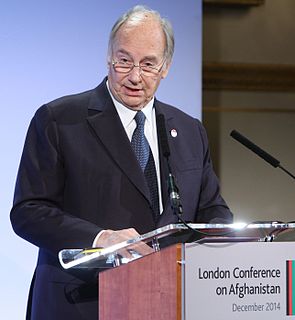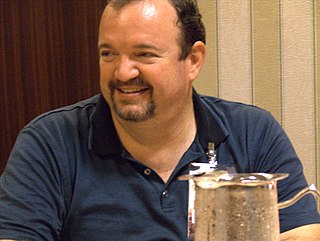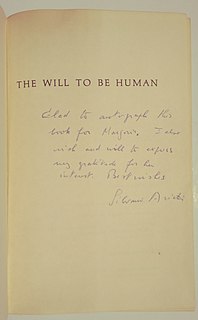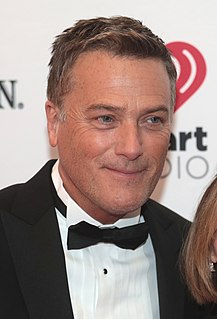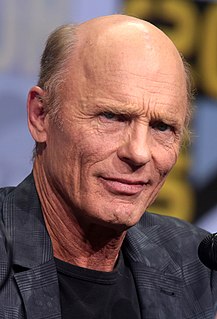Ein Zitat von Aga Khan IV
Mein Großvater war ein äußerst begabter Mensch, und von seinen vielen Eigenschaften hatte mich eine immer besonders beeindruckt. Während die Vergangenheit ein Buch war, das er viele Male gelesen hatte, war die Zukunft nur ein weiteres literarisches Kunstwerk, in das er sich mit tiefem Nachdenken und Konzentration vertiefte. Unzählige Menschen haben mir seit seinem Tod erzählt, wie er in Zukunft gelesen hat, und das war sicherlich eine seiner ganz großen Stärken.
Themen zitieren
Immer
unter
Kunstbuch
Sicherlich
Konzentration
Tod
Tief
Tiefer Gedanke
Zukunft
Begabter
Großvater
Großartig
Hatte
sich selbst
beeindruckt
Nur
ein
Literarisch
Viele
Mögen
mich
Mehr
Am meisten
Mein Großvater
Besonders
frühere
Menschen
Person
Gießen
Qualitäten
Lesen
Seit
Stärken
Sie
dachten
Zeiten
,
die
während
der Arbeit
sehr genutzt
wurden
Verwandte Zitate
Ich bin nicht jemand, der eine Liste großartiger Bücher hat, die ich lesen würde, wenn ich nur Zeit hätte. Wenn ich einen bestimmten sogenannten Klassiker lesen möchte, lese ich ihn. Wenn ich mehr Zeit hätte, würde ich sicherlich mehr lesen, aber ich würde so lesen, wie ich es immer tue – das heißt, ich würde alles lesen, was mich gerade interessiert, nicht unbedingt Klassiker.
Ich wollte meinem Kind nicht das Lesen beibringen, also las ich ihm nachts vor und schloss das Buch an der interessantesten Stelle. Er sagte: „Was ist dann passiert, Papa?“ Ich sagte: „Wenn du lesen lernst, kannst du es herausfinden.“ Ich bin zu müde zum Lesen. Ich werde dir morgen vorlesen.“ Er hatte also das Bedürfnis, lesen lernen zu wollen. Bringen Sie Kindern nicht das Lesen bei. Bringen Sie ihnen keine Mathematik bei. Geben Sie ihnen einen Grund, es zu wollen. In der Schule arbeiten sie verkehrt herum.
[Ein] Ehepaar, das ich kannte – alte Freunde – fragte mich, woran ich als nächstes arbeiten würde. Ich sagte ihnen, dass ich in naher Zukunft ein Buch über AIDS-Konzentrationslager schreiben wollte. Sie antworteten vehement: Sie hielten es für eine schreckliche Idee. Ihre Worte schockierten und machten mich zugleich traurig. „Wollen Sie wirklich ein Buch über Homosexuelle schreiben?“ Sie haben mich gefragt. „Werden Menschen, die Ihr Werk lesen, nicht zur Sünde verleitet?“ Mir fällt auf, dass ich in letzter Zeit nicht viel von ihnen höre.
Zu diesem Zeitpunkt hatte ich kürzlich ein Buch mit dem Titel „Amazing Grace“ fertiggestellt, von dem viele Leute sagen, dass es sehr schmerzhaft sei, es zu lesen. Nun, wenn das Lesen schmerzhaft war, war es auch schmerzhaft, zu schreiben. Während ich dieses Buch schrieb, hatte ich zwei Jahre lang Schmerzen in der Brust.
Mittlerweile erzählen Schriftsteller ihren Lesern routinemäßig von ihren Scheidungen. Ein Literat, der Bücher rezensiert, schrieb in der Rezension einer Studie über Ruskin, dass er noch nie ein Buch von Ruskin gelesen habe, dass die Studie ihn jedoch in seiner Überzeugung bestärkt habe, dass er kein Buch von Ruskin lesen wollte. Dieser Mann schreibt sehr oft über sein Familienleben.
Der Mensch, der ein großes Kunstwerk würdigt, hat das Gefühl, dass das Werk in ihm wächst, während er sich auf ein längeres Erfassen neu entstehender Randbedeutungen einlässt. Er hat das Gefühl, dass auch er kreativ ist, dass er selbst zu seiner Erfahrung und seinem Verständnis beiträgt. Darüber hinaus möchte er sich mehrfach mit dem Kunstwerk auseinandersetzen. Er wird davon nicht so schnell müde, wie es der Fall wäre, wenn er eine rein logische Aussage gelesen hätte. Er erkennt, dass das Kunstwerk nicht nur Informationen übermittelt; es erzeugt Vergnügen.
Da er nicht die Zeit hatte, jedes neue Buch auf seinem Fachgebiet zu lesen, nutzte der große polnische Anthropologe Bronislaw Malinowski eine einfache und effiziente Methode, um zu entscheiden, welche seine Aufmerksamkeit wert waren: Nachdem er ein neues Buch erhalten hatte, überprüfte er sofort den Index, um zu sehen, ob sein Name wurde genannt und wie oft. Je mehr „Malinowski“, desto fesselnder das Buch. Kein „Malinowski“, und er bezweifelte, dass das Thema des Buches überhaupt Anthropologie war.
In Somerset habe ich mit Marcus Trescodick gespielt, der sehr offen über seinen Kampf gegen Depressionen und Angstzustände gesprochen hat. Ich habe ein paar Gespräche mit ihm über seine Probleme geführt, aber ich habe auch sein Buch gelesen, das mir einen tollen Einblick in seine Situation verschaffte.
Ich habe alles gelesen. Ich lese einen Roman von John Grisham, ich sitze da und lese einen ganzen Gedichtband von Maya Angelou, oder ich lese einfach etwas von Mary Oliver – das ist ein Buch, das ich zu Weihnachten geschenkt bekommen habe. Kein bestimmtes Genre. Und ich lese auf Französisch, und ich lese auf Deutsch, und ich lese auf Englisch. Ich liebe es zu sehen, wie andere Menschen Sprache verwenden.
Jedes Stück Wissen, das der Schüler selbst erworben hat, jedes Problem, das er selbst gelöst hat, wird durch die Eroberung viel gründlicher zu seinem Eigentum, als es sonst sein könnte. Die anfängliche Aktivität des Geistes, die sein Erfolg mit sich bringt, die dafür notwendige Konzentration des Denkens und die Aufregung, die sich aus seinem Triumph ergibt, tragen dazu bei, die Tatsachen in seinem Gedächtnis auf eine Weise zu registrieren, wie es keine bloße Information ist, die er von einem Lehrer hört oder in einem Buch liest Schulbuch, kann angemeldet werden.
Ich wünschte wirklich, er hätte mich nicht dazu gebracht, es zu hassen, die Bibel zu lesen. Dass es mir mein ganzes Leben lang in den Rachen gedrängt wurde, hatte mich beim Lesen verbittert. Ich habe es geglaubt, aber mein Vater hatte es zu oft zu seinem Vorteil ausgenutzt und die darin enthaltenen Teile ignoriert, die auf seine Fehler hinweisen würden. Als würde man über Beau urteilen, ohne ihn überhaupt zu kennen. Das stand auch in der Bibel.
